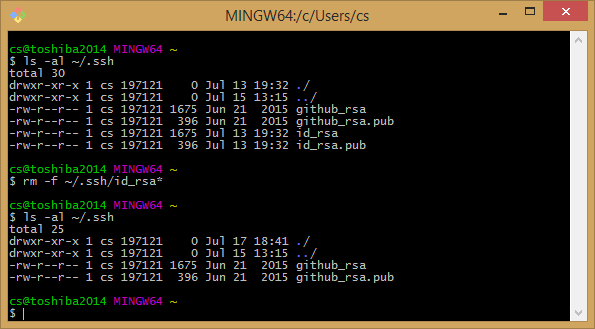Delete Old Ssh Key And Generat New One
Adding your SSH key to the ssh-agent. Before adding a new SSH key to the ssh-agent to manage your keys, you should have checked for existing SSH keys and generated a new SSH key. When adding your SSH key to the agent, use the default macOS ssh-add command, and not an application installed by macports, homebrew, or some other external source. When you add a ssh key you don't check for the existence of newline (n) inside the key content. Ssh keys that include new lines can't be deleted from authorizedkeys #370. Bug fix for edit-hook API endpoint. Fixes issue #283 Delete old temp local copy before we create a new temp local copy. In the wiki title replace tab with. Ssh-keygen is a tool for creating new authentication key pairs for SSH. This is a tutorial on its use, and covers several special use cases. Host keys are just ordinary SSH key pairs. Each host can have one host key for each algorithm. The host keys are almost always stored in the following files.P oldpassphrase and -N new.
One can delete SSH Keys using the following simple method on Linux or Unix-like systems.
How to delete SSH keys on Linux or Unix
The first step is to disable user login using command as follows:
Linux Lock An Account
Log in as root user:sudo -i
Say lock out user named vivek. The syntax is:# passwd -l userName
# passwd -l vivek
FreeBSD Local An Account
# pw lock userName
# pw local vivek

Solaris / HP-UX UNIX Lock An Account
# passwd -l userNameL
# passwd -l vivek
Remove SSH Keys
The $HOME/.ssh/ stores all required ssh keys. Simply rename the directory using the mv command or delete the directory using rm command# mv /home/vivek/.ssh /home/vivek/nosshlogin
OR# rm -rf /home/vivek/.ssh
For remote server edit $HOME/.ssh/authorized_keys or $HOME/.ssh/authorized_keys2 file and remove public key. This will delete login from home computer into your server. Finally, you can always delete user from your system using the pw on FreeBSD or userdel on Linux / UNIX.
A note about removing a particular host key from SSH’s known_hosts file
Use the ssh-keygen command as followsssh-keygen -R your-hostname
ssh-keygen -R server1.cyberciti.biz
DenyUsers option can block any user
Another option is to edit the sshd_config file on your remove Unix or Linux server. From the man page:
DenyUsers option can block any user. This option can be followed by a list of user name patterns, separated by spaces. Login is disallowed for user names that match one of the patterns. Only user names are valid; a numerical user ID (UID) is not recognized. By default, login is allowed for all users. If the pattern takes the form USER@HOST then USER and HOST are separately checked, restricting logins to particular users from particular hosts.
So edit file:sudo vi /etc/ssh/sshd_config
Block user vivek from log in, append or modify as follows:DenyUsers vivek
Say you want to deny wendy and vivek users, run:DenyUsers vivek, wendy
Save and close the file. Reload or restart the sshd service on Linux or Unixsudo systemctl restart sshd
ORsudo service sshd restart
For more info see:
Delete Old Ssh Key And Generate New One Word
ADVERTISEMENTS